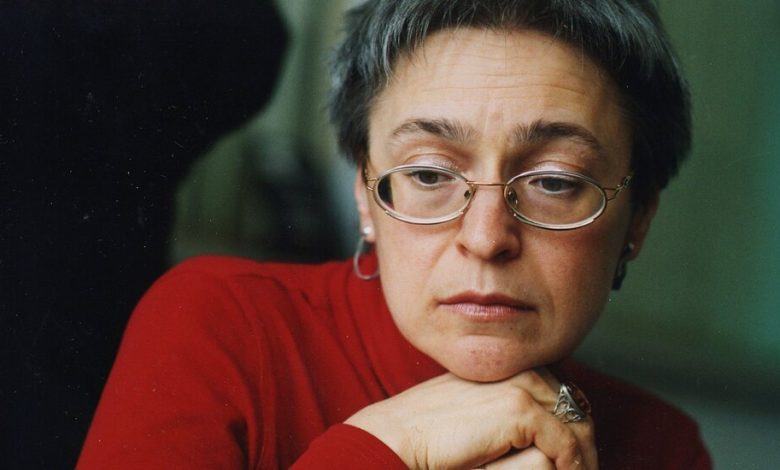Why Anna Politkovskaya Was a Pillar of Press Freedom

Anna Politkovskaya was one of Russia’s most acclaimed journalists and a vocal critic of the Kremlin. Her murder in 2006 sent shock waves not just through Russia but around the world, highlighting the growing dangers of reporting critically about the Kremlin in the country.
Outrage and intrigue around the case have persisted in the years since, and then spiked again on Tuesday after President Vladimir V. Putin let it be known that he had pardoned a man convicted of organizing the assassination.
Best known for her scathing criticism of Mr. Putin and his policies in the Russian republic of Chechnya, Ms. Politkovskaya earned international recognition in her lifetime and has been celebrated as a pillar of press freedom in the years since her death.
A brazen assassination
Ms. Politkovskaya was shot dead in her Moscow apartment building on Oct. 7 — Mr. Putin’s birthday — in 2006. She was 48, with two adult children.
The question of who was behind her death has long been the subject of international attention. Her colleagues, friends and international press freedom groups have said that she was killed to silence her, or in retaliation for past articles. They also say they suspect that the Russian government was involved in her death.
While a court convicted several men of carrying out the killing, the authorities left unanswered the question of who organized it. Mr. Putin, speaking soon after Ms. Politkovskaya’s death, denied any role. The international criticism over the killing, he argued, had created a bigger problem for Russia than her work as an investigative journalist had. Suspicions also focused on Ramzan A. Kadyrov, the pugnacious leader of Chechnya, a territory in the Caucasus that fought two wars with Russia but is now run by a Kremlin loyalist. Mr. Kadyrov was the target of some of her most critical reporting.
Making her name
Ms. Politkovskaya was a veteran journalist with few equals in Russia. A special correspondent for Novaya Gazeta, the internationally renowned independent newspaper, she had become one of the country’s most prominent human rights advocates and critics of Mr. Putin, whom she accused of stifling civil society and allowing a climate of official corruption and brutality.
After earning a degree in journalism from Moscow State University in 1980 and working for several trade newspapers, Ms. Politkovskaya landed at Novaya Gazeta in 1999. That’s where she made her name covering the second Chechen war, a brutal conflict that pitted separatists against the Kremlin’s forces, as well as the terrorist attacks that spilled over from the war in Moscow and other Russian cities.
Ms. Politkovskaya investigated allegations of abuse on all sides in the war, and her unvarnished accounts of official brutality and crime in Chechnya drew criticism from powerful people in the Russian military and in government circles who regarded the descriptions of acts of savagery committed by their country’s soldiers as “unpatriotic.”
Ms. Politkovskaya wrote of torture, mass executions, kidnappingsand the sale by Russian soldiers of Chechen corpses to their families for proper Islamic burial.
Dangerous work
As the Russian news media came under intensifying pressure from the Putin government, Ms. Politkovskaya remained defiant, often speaking abroad about a war she called “state versus group terrorism.”
A target of intimidation, Ms. Politkovskaya received death threats and at least once left Russia, fearing for her safety. In 2004 Ms. Politkovskaya said she had been poisoned while on an airplane; she passed out on the flight but survived.
Her murder two years later stunned many in Russia, not only for the brutality with which it was carried out but also because Ms. Politkovskaya’s public stature had seemed to lend her an aura of invincibility. Her death had a chilling effect on Russian press freedom, which has severely contracted in the years since.
A lasting legacy
The effects of Ms. Politkovskaya’s reporting and her death are still felt many years later, inspiring plays, films and awards in the journalist’s name.
Press freedom advocates and international officials continue to mark the anniversary of her murder, with the State Department in 2021 commemorating Ms. Politkovskaya’s “brave work bringing light to human rights abuses” and saying that the “continued impunity” for those who ordered the assassination undermines freedom of speech in Russia.
She was one of at least six Novaya Gazeta journalists murdered since 2000. Its editor, Dmitri A. Muratov, and Maria Ressa, a journalist in the Philippines, were awarded the Nobel Peace Prize in 2021 for their “courageous fight for freedom of expression.”
Ms. Politkovskaya’s desk at the now-shuttered newspaper sat untouched for 17 years — with her typewriter, glasses, notes and a book, the title of which seemed to sum up the impunity of the Putin era: “History of an Inconclusive Investigation.”
Neil MacFarquhar and C. J. Chivers contributed reporting.




